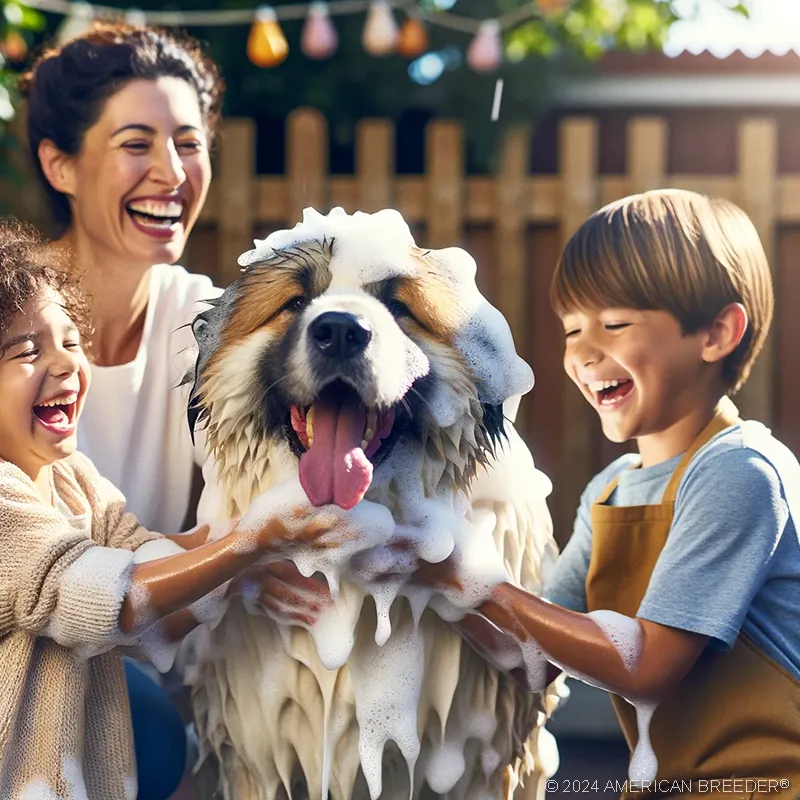Tornjak Dog: A Breed Rich in History and Loyalty
Introduction to the Tornjak Dog
The Tornjak, often referred to as the Bosnian-Herzegovinian Shepherd Dog, is a magnificent breed with a rich history and unique characteristics. Beyond their striking appearance and impressive size, Tornjaks are known for their unwavering loyalty and protective nature, making them exceptional companions for families and livestock.
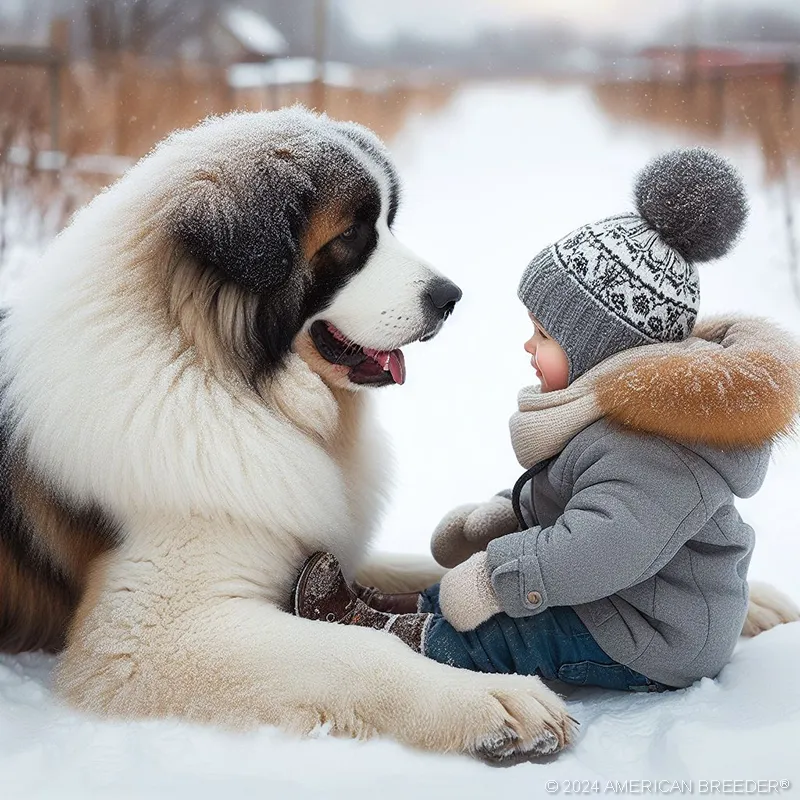 Origin and Development of the Tornjak: The Tornjak's history dates back centuries, originating in the Balkans, particularly Bosnia and Herzegovina. Initially bred for guarding livestock, they were instrumental in protecting herds from predators. This breed's development is a testament to the enduring partnership between humans and dogs, as Tornjaks played a vital role in the region's agricultural life.
Origin and Development of the Tornjak: The Tornjak's history dates back centuries, originating in the Balkans, particularly Bosnia and Herzegovina. Initially bred for guarding livestock, they were instrumental in protecting herds from predators. This breed's development is a testament to the enduring partnership between humans and dogs, as Tornjaks played a vital role in the region's agricultural life.
Historical Significance and Cultural Relevance: The Tornjak's historical significance extends beyond their practical use as herding and guarding dogs. They are deeply woven into the cultural fabric of the Balkans, symbolizing resilience, loyalty, and the enduring bond between humans and their canine companions. Tornjaks remain an integral part of rural life in the region, embodying the enduring spirit of the people they serve.
Purpose and Original Use of the Tornjak: Tornjaks were initially bred to fulfill a crucial role: protecting livestock from wolves, bears, and other predators. Their keen instincts, courage, and protective nature made them invaluable to shepherds and farmers. Today, while they continue to excel as guardians, they have also found their place as beloved family pets, where their gentle and loyal disposition shines.
Tornjak Breed Background
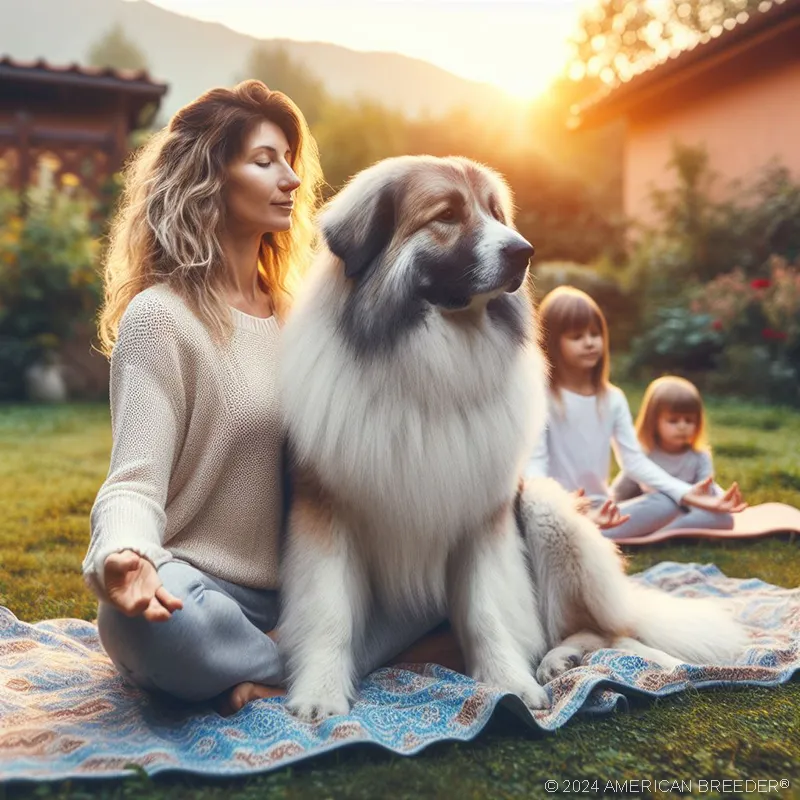 Kennel Clubs that Classify, Group, or Register Tornjak Dogs: Tornjaks have gained recognition from various kennel clubs. One notable organization is the United Kennel Club (UKC), which officially recognized the Tornjak in 2006, classifying them under the Guardian Dog Group. Additionally, the Fédération Cynologique Internationale (FCI) also acknowledges the breed.
Kennel Clubs that Classify, Group, or Register Tornjak Dogs: Tornjaks have gained recognition from various kennel clubs. One notable organization is the United Kennel Club (UKC), which officially recognized the Tornjak in 2006, classifying them under the Guardian Dog Group. Additionally, the Fédération Cynologique Internationale (FCI) also acknowledges the breed.
Distinctive Features or Markings: Tornjaks are striking in appearance, characterized by their robust build and a thick double coat. They possess a strong, well-proportioned body, with males typically standing between 25 to 30 inches at the shoulder and females slightly smaller. The breed's striking features include a large, broad head with a well-defined stop, expressive eyes, and triangular ears that hang close to the head. Their tail is long and bushy, often curled over their back.
Average Litter Size for Tornjak Dogs: Tornjaks typically have litters that range in size from 5 to 10 puppies, although variations can occur. Proper care during pregnancy and whelping is essential to ensure the health and well-being of both the mother and her puppies. Early socialization is crucial for Tornjak puppies to develop into well-adjusted adults, given their protective instincts.
Tornjak's Appearance
Coat Type, Color Variations, and Patterns: Tornjaks boast a luxurious double coat that provides insulation and protection in varying weather conditions. Their outer coat is dense, straight, and slightly coarse, while the undercoat is soft and thick. Coat colors include various shades of fawn, from pale cream to deep mahogany. Some Tornjaks may also have a black mask and ears, adding to their striking appearance. White markings on the feet, chest, and tail tip are common.
Size, Weight, Activity Level, and Physical Appearance: Tornjaks are substantial dogs, with males weighing between 88 to 110 pounds (40 to 50 kilograms) and females slightly smaller, typically ranging from 66 to 88 pounds (30 to 40 kilograms). Their imposing size aligns with their historical role as protectors of livestock. Tornjaks possess a well-proportioned and muscular physique, with a powerful neck and sturdy limbs that convey strength and agility.
Distinctive Features or Markings: While Tornjaks' overall appearance exudes strength and confidence, it's their distinctive features that truly set them apart. Their expressive eyes are medium-sized and almond-shaped, radiating intelligence and vigilance. Dark brown eyes are preferred, harmonizing with their coat color. The breed's ears are set high and have a triangular shape, hanging close to the head. When alert, their ears may rise slightly. The tail of the Tornjak is long, thickly coated, and carried in a gentle curve over the back, contributing to their regal and majestic presence.
Tornjak's Temperament and Personality
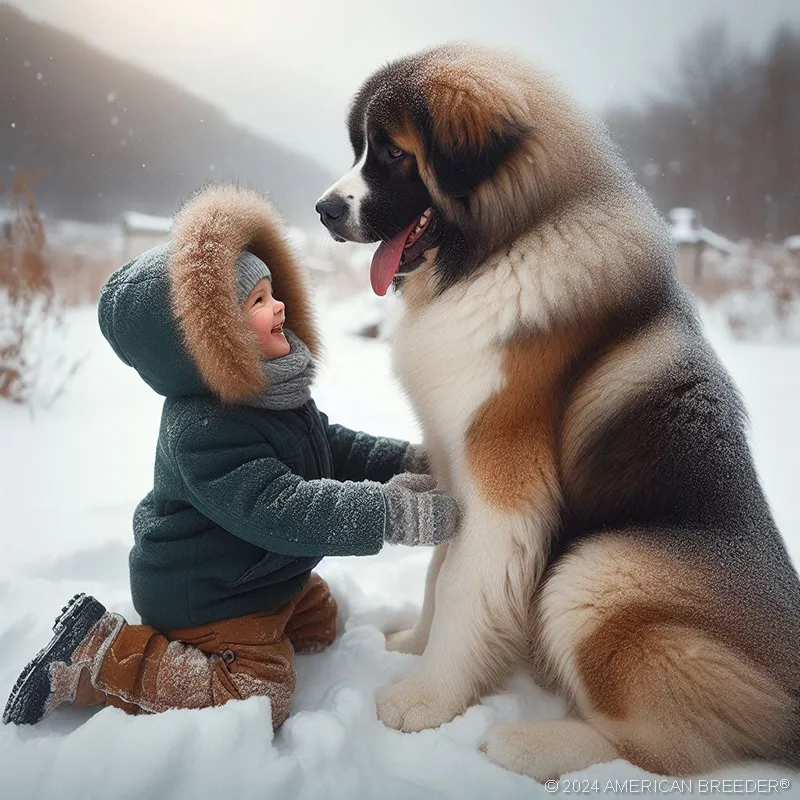 Typical Temperament Traits and Behavior Tendencies:
Typical Temperament Traits and Behavior Tendencies:
Tornjaks are renowned for their exceptional temperament, characterized by unwavering loyalty, protectiveness, and a gentle disposition. They are deeply devoted to their families, often forming strong bonds with their human companions. This loyalty extends to their role as guardians, where they display incredible courage and fearlessness when protecting their loved ones.
Energy Levels and Activity Requirements
While Tornjaks are considered a high-energy breed, their energy levels can vary from one individual to another. It's essential to understand that their activity requirements may be influenced by factors such as age, health, and individual disposition. Generally, they benefit from regular exercise and mental stimulation to keep both their bodies and minds engaged.
Intelligence and Trainability: Tornjaks are highly intelligent dogs, known for their problem-solving abilities and quick learning. However, they can also be independent thinkers, which requires consistent and patient training. Early socialization and obedience training are vital to ensure they grow into well-mannered adults. Positive reinforcement techniques work particularly well with Tornjaks, as they respond positively to praise and rewards.
Socialization and Interaction with Other Pets: Proper socialization is crucial for Tornjak puppies to develop into well-rounded adults. While they have a protective nature, early exposure to various people, animals, and environments helps them become more accepting and adaptable. Tornjaks can coexist peacefully with other pets when introduced and socialized correctly. However, their protective instincts may lead to them being cautious around unfamiliar animals.
Tornjak's Health and Care
 Common Health Issues and Genetic Predispositions: Tornjaks are generally a healthy breed, but like all dogs, they can be prone to certain health issues. Hip dysplasia is a concern in larger breeds, including Tornjaks. Responsible breeders conduct health screenings to minimize the risk of hereditary diseases. Regular veterinary check-ups and a well-balanced diet contribute to their overall well-being.
Common Health Issues and Genetic Predispositions: Tornjaks are generally a healthy breed, but like all dogs, they can be prone to certain health issues. Hip dysplasia is a concern in larger breeds, including Tornjaks. Responsible breeders conduct health screenings to minimize the risk of hereditary diseases. Regular veterinary check-ups and a well-balanced diet contribute to their overall well-being.
Grooming Requirements: Tornjaks have a beautiful double coat that requires regular grooming to keep it in optimal condition. Brushing them at least once a week helps remove loose fur and prevents matting. During shedding seasons, more frequent brushing is necessary. Tornjaks' ears should be checked regularly for signs of infection, and their teeth should be brushed to maintain good oral health.
Nutritional Needs and Dietary Considerations: A nutritious diet is vital for Tornjak dogs to support their growth, activity levels, and overall health. High-quality commercial dog food, whether dry kibble or wet, should be the foundation of their diet. Protein, fat, and carbohydrates should be appropriately balanced. Consult with your veterinarian to determine the best diet plan for your Tornjak, taking into account factors such as age, activity level, and any specific health considerations.
Exercise and Mental Stimulation: Tornjaks thrive on physical activity and mental stimulation. Daily exercise is essential to keep them happy and healthy. Activities such as long walks, hikes, and interactive play sessions provide the physical outlet they need. Additionally, puzzle toys, obedience training, and agility exercises engage their sharp minds, preventing boredom and potential behavioral issues.
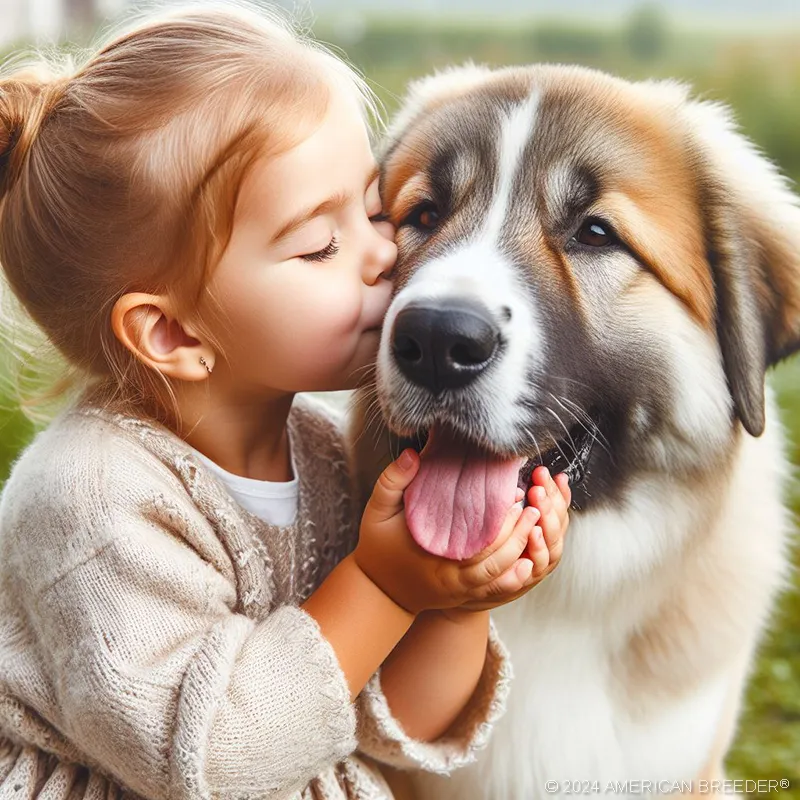 Tornjak's Diet and Nutrition
Tornjak's Diet and Nutrition
Protein and Nutritional Needs: Protein is a fundamental component of a Tornjak's diet. As a high-energy breed, they require a diet rich in protein to support muscle development and overall health. Look for dog food that lists a high-quality protein source, such as chicken, beef, or fish, as the primary ingredient.
Balanced Diet for Tornjaks: Tornjaks benefit from a balanced diet that includes protein, fat, carbohydrates, vitamins, and minerals. To ensure their nutritional needs are met, consider commercial dog food formulated for large breeds. These formulas often contain the right balance of nutrients for their size and activity level.
Feeding Schedule and Portions: Establishing a consistent feeding schedule is essential for Tornjak dogs. Puppies typically require more frequent meals to support their growth, while adults may do well with two meals a day. Monitor their weight and adjust portion sizes accordingly to maintain a healthy body condition. Avoid overfeeding, as Tornjaks are prone to obesity, which can lead to health issues.
Hydration and Fresh Water: Adequate hydration is crucial for Tornjaks, especially during active periods. Ensure your dog has access to fresh, clean water at all times. Monitor their water intake, as it can vary depending on weather conditions and activity levels. Proper hydration is essential to support their overall well-being.
Common Tornjak Myths and Misconceptions
Myth: Tornjaks Are Aggressive: One prevalent myth about Tornjaks is that they are aggressive dogs. In reality, Tornjaks are protective and can be reserved around strangers, but this does not equate to aggression. Proper socialization and training can help them become well-mannered and approachable.
Myth: Tornjaks Need a Constant Job: While Tornjaks have a history of herding and guarding livestock, they don't necessarily need a constant job to be happy. They do, however, require mental stimulation and physical exercise to prevent boredom. Engaging in activities like obedience training and interactive play can satisfy their need for mental challenges.
Myth: Tornjaks Are Low-Energy Dogs: Another misconception is that Tornjaks are low-energy dogs due to their calm demeanor indoors. While they can be well-behaved indoors, they still require regular exercise to maintain their physical and mental health. Tornjaks are, in fact, a high-energy breed that thrives on outdoor activities.
Myth: Tornjaks Are Not Suitable for Families: Some believe that Tornjaks are not suitable for families due to their protective nature. However, with proper training and socialization from a young age, Tornjaks can be excellent family dogs. Their loyalty and affection make them devoted companions and protectors of their loved ones.
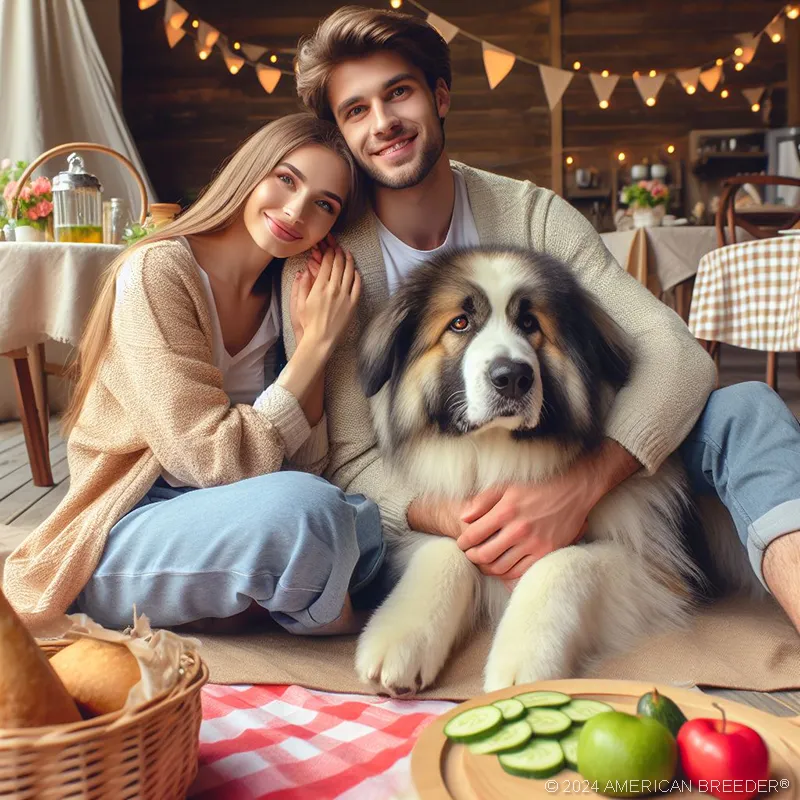 Living Arrangements and Environment for Tornjaks
Living Arrangements and Environment for Tornjaks
Choosing the Right Living Arrangement: When considering a Tornjak, it's essential to choose the right living arrangement. Tornjaks can adapt to different environments, including apartments, houses, and rural areas. However, they thrive in homes with access to a yard where they can roam and play.
Space Requirements and Exercise Options: Tornjaks require ample space to move around and play. A securely fenced yard is ideal for them to burn off energy. Daily exercise, such as long walks and play sessions, is necessary to keep them physically and mentally stimulated. Tornjaks also enjoy activities like fetch and agility training.
Climate Considerations and Adaptability: Tornjaks have thick double coats that provide insulation. While they can adapt to various climates, it's essential to consider extreme weather conditions. In hot weather, provide shade and ensure they stay hydrated. In cold weather, protect them from freezing temperatures, as their short coat may not provide sufficient insulation.
Creating an Ideal Living Environment: To create an ideal living environment for your Tornjak, focus on mental stimulation and social interaction. Interactive toys, puzzle feeders, and obedience training can keep their minds engaged. Additionally, spend quality time with your Tornjak to strengthen your bond and meet their emotional needs.
Training and Obedience for Tornjaks
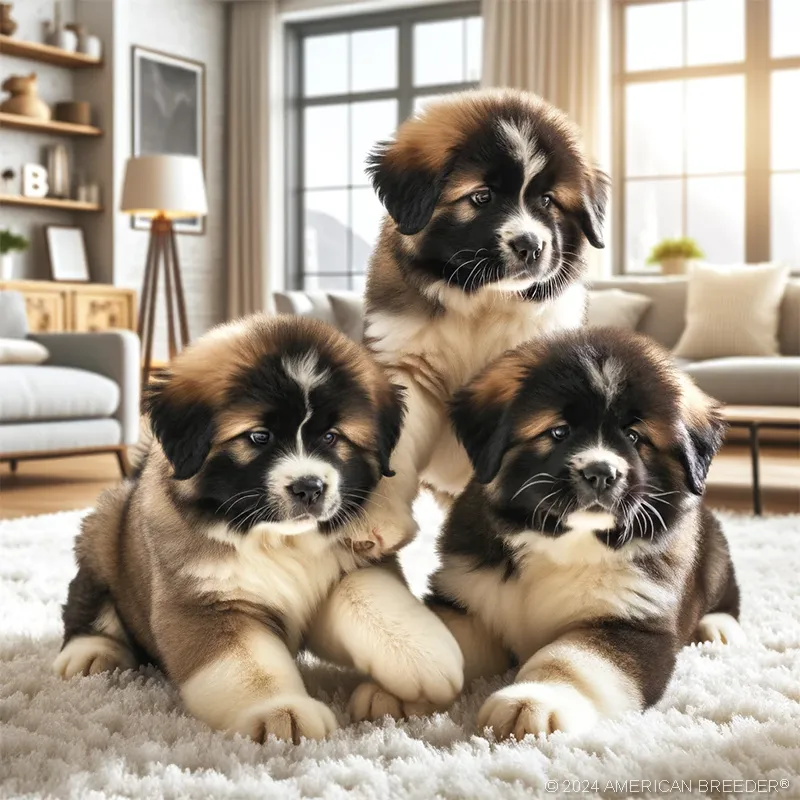 Basic Obedience Training and Commands: Tornjaks are intelligent and responsive to training. Basic obedience commands such as "sit," "stay," and "recall" are essential for their safety and well-being. Consistency and positive reinforcement are key to successful training. Start training early in puppyhood to establish good behavior patterns.
Basic Obedience Training and Commands: Tornjaks are intelligent and responsive to training. Basic obedience commands such as "sit," "stay," and "recall" are essential for their safety and well-being. Consistency and positive reinforcement are key to successful training. Start training early in puppyhood to establish good behavior patterns.
Advanced Training and Specialized Activities: Tornjaks thrive on mental challenges, making them excellent candidates for advanced training and specialized activities. Consider enrolling them in agility courses, where their agility and problem-solving skills shine. Tracking and search and rescue training are also well-suited to their abilities, allowing them to use their keen senses effectively.
Behavioral Challenges and Training Considerations: Tornjaks, while loyal and protective, may face specific behavioral challenges. One common issue is barking, as they are naturally vigilant. Training techniques like desensitization and counterconditioning can help manage excessive barking. Additionally, addressing resource guarding and separation anxiety early can prevent these behaviors from becoming problematic.
House Training and Potty Training Tips: Housebreaking your Tornjak is a crucial aspect of training. Establish a consistent schedule for bathroom breaks, and reward them for successful outdoor potty trips. Be patient during the house training process, as it may take some time for them to grasp the concept fully.
Leash Training and Walking Etiquette: Proper leash training ensures enjoyable walks with your Tornjak. Start leash training early, using positive reinforcement to encourage loose leash walking. Tornjaks are strong dogs, so teaching them leash manners is essential for both their safety and yours. Additionally, practicing good walking etiquette, such as yielding to other pedestrians and picking up after your dog, is vital when taking them on walks in public areas.
Exercise and Activity for a Happy Tornjak
Daily Exercise Needs and Recommendations: Tornjaks have high energy levels and require daily exercise to maintain their physical and mental well-being. Aim for at least 60 minutes of exercise per day, which can include walks, playtime, and mental stimulation activities. Regular exercise prevents boredom and helps prevent behavioral issues.
Mental Stimulation Activities and Games: Tornjaks' intelligence necessitates mental stimulation. Incorporate brain games and puzzle toys into their routine to challenge their problem-solving skills. Activities like hide and seek, where they use their keen sense of smell to locate treats or toys, are particularly engaging for them.
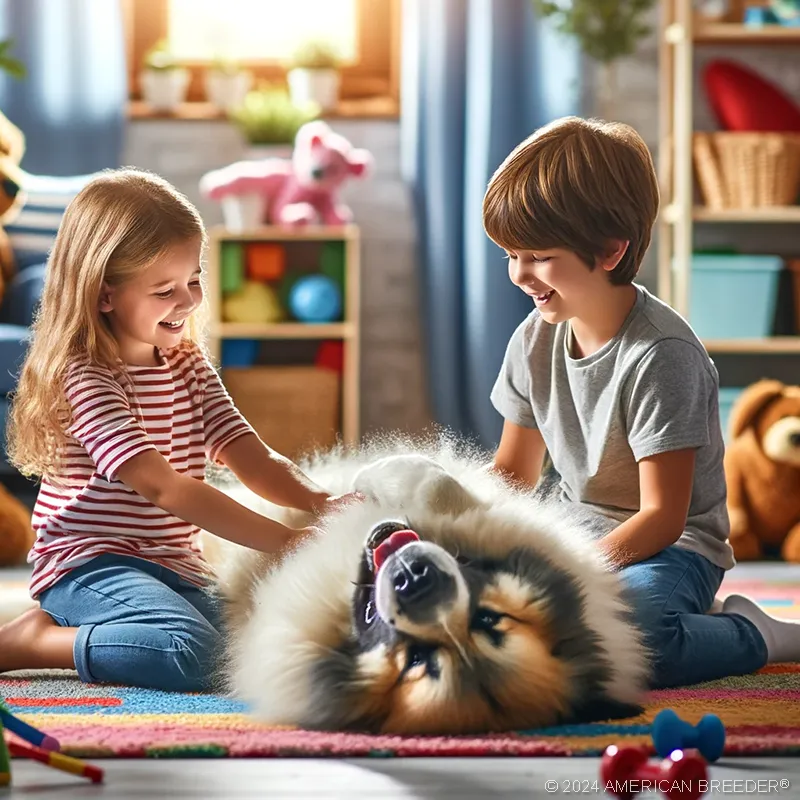 Exercise Routines and Activity Ideas: Establishing a consistent exercise routine is crucial for Tornjaks. Consider activities like hiking, jogging, and agility courses to keep them physically active. Indoor activities like fetch and tug-of-war are excellent options during inclement weather. Rotate through various activities to prevent boredom and keep them engaged.
Exercise Routines and Activity Ideas: Establishing a consistent exercise routine is crucial for Tornjaks. Consider activities like hiking, jogging, and agility courses to keep them physically active. Indoor activities like fetch and tug-of-war are excellent options during inclement weather. Rotate through various activities to prevent boredom and keep them engaged.
Energy Outlets for High-Energy Breeds: Tornjaks are considered high-energy breeds, and it's vital to channel their energy appropriately. Engaging in activities that challenge both their minds and bodies helps satisfy their innate drive. Interactive toys that dispense treats or require problem-solving are effective tools for energy outlets.
Financial Planning for Tornjak Ownership
Typical Price Range for Purchasing Tornjaks: The cost of acquiring a Tornjak can vary depending on factors such as the breeder's reputation, pedigree, and geographic location. On average, you can expect to pay between $800 to $2,000 for a Tornjak puppy from a reputable breeder.
Initial Costs and Ongoing Expenses: Beyond the purchase price, consider initial costs such as vaccinations, spaying/neutering, microchipping, and basic supplies like food bowls and a leash. Ongoing expenses include high-quality dog food, grooming, veterinary care, training classes, toys, and regular check-ups. Budgeting for these costs is essential to provide the best care for your Tornjak.
Pet Insurance and Budgeting: Pet insurance can provide peace of mind in case of unexpected medical expenses. Research different insurance providers and plans to find one that suits your needs. Additionally, create a monthly budget that includes anticipated expenses for your Tornjak's care, allowing you to plan for their well-being effectively.
Pet Care During Vacations and Travel: Planning for pet care during vacations and travel is essential. Options include boarding facilities, pet sitters, or trusted friends or family members who can care for your Tornjak in your absence. Ensure your chosen caregiver is familiar with your dog's needs and routine to provide a smooth transition during your absence.
Responsible Ownership and Ethical Considerations
Adopting from Shelters or Rescues: Consider adopting a Tornjak from shelters or rescues, where dogs in need of loving homes await. By choosing this path, you provide a second chance to a Tornjak in search of a forever family, promoting responsible and compassionate ownership.
Choosing Reputable Breeders: When acquiring a Tornjak from a breeder, research and choose a reputable one who prioritizes the health and well-being of their dogs. Reputable breeders conduct health screenings, provide proper socialization, and offer a supportive environment for their puppies.
Avoiding Puppy Mills: Puppy mills prioritize profit over the welfare of dogs, often resulting in poor living conditions and health issues. Avoid purchasing Tornjaks from puppy mills or backyard breeders, as it perpetuates unethical breeding practices. Supporting responsible breeders or adopting from shelters encourages ethical ownership.
Spaying/Neutering Considerations: Responsible ownership includes making informed decisions about spaying/neutering your Tornjak. Consult with your veterinarian to determine the appropriate timing for this procedure, considering factors such as age, health, and breeding intentions. Responsible breeding practices aim to control the breed's population and promote the well-being of individual dogs.
Commitment and Time Dedication: Owning a Tornjak is a significant commitment that involves time and dedication. Be prepared to invest time in training, exercise, grooming, and building a strong bond with your dog. Tornjaks thrive on companionship and being an integral part of their family's life.
Legal Responsibilities and Regulations
Licensing Requirements and Local Regulations: Laws regarding dog ownership vary by location. Familiarize yourself with licensing requirements and local regulations related to Tornjak ownership. Compliance with these laws ensures both your dog's well-being and the safety of your community.
Understanding Leash Laws and Vaccination Requirements: Leash laws and vaccination mandates are critical components of responsible dog ownership. Leash laws dictate where and when your Tornjak must be on a leash, promoting safety for both your dog and others. Staying up-to-date on vaccinations protects your dog from preventable diseases and supports community health.
In Conclusion
This comprehensive guide has provided an in-depth exploration of the Tornjak Dog, covering every aspect of their characteristics, history, care, and significance. By delving into their origins, temperament, health considerations, and the responsibilities of ownership, you are now equipped with a deep understanding of the Tornjak breed.
A Lifetime of Companionship: The Tornjak offers a unique companionship that spans a lifetime. Their unwavering loyalty, protective nature, and gentle disposition make them cherished family members. Whether they are by your side during outdoor adventures or providing a sense of security at home, Tornjaks enrich the lives of those fortunate enough to have them as companions.
A Breed with Resilience: Beyond their role as faithful companions, Tornjaks symbolize resilience and adaptability. Rooted in the history of the Balkans, they have weathered centuries of challenges alongside the people they serve. This enduring spirit is a testament to their remarkable character and the profound connection between humans and their canine counterparts.
A Bright Future for Tornjaks: As you embark on your journey with a Tornjak, remember that your commitment to responsible ownership is essential. By providing them with love, proper care, and a supportive environment, you ensure a bright future for this extraordinary breed. Your Tornjak's unique personality and unwavering devotion will reward you with a bond that deepens over time.
Continued Learning and Appreciation: Tornjaks continue to captivate enthusiasts worldwide with their intelligence, loyalty, and protective instincts. Your journey with a Tornjak is an ongoing opportunity for learning and appreciation. As you explore their unique traits and engage with the Tornjak community, you contribute to the preservation and understanding of this remarkable breed.
In closing, we hope this comprehensive guide not only equips you with practical knowledge but also fosters a deep appreciation for the Tornjak Dog. Whether you are considering welcoming one into your family or are already fortunate to have one by your side, this guide serves as a valuable resource on your journey with these magnificent dogs. May your life be enriched by the love and companionship of the Tornjak, a breed that embodies loyalty, resilience, and unwavering devotion.
Tornjak Dog Quick Reference Guide
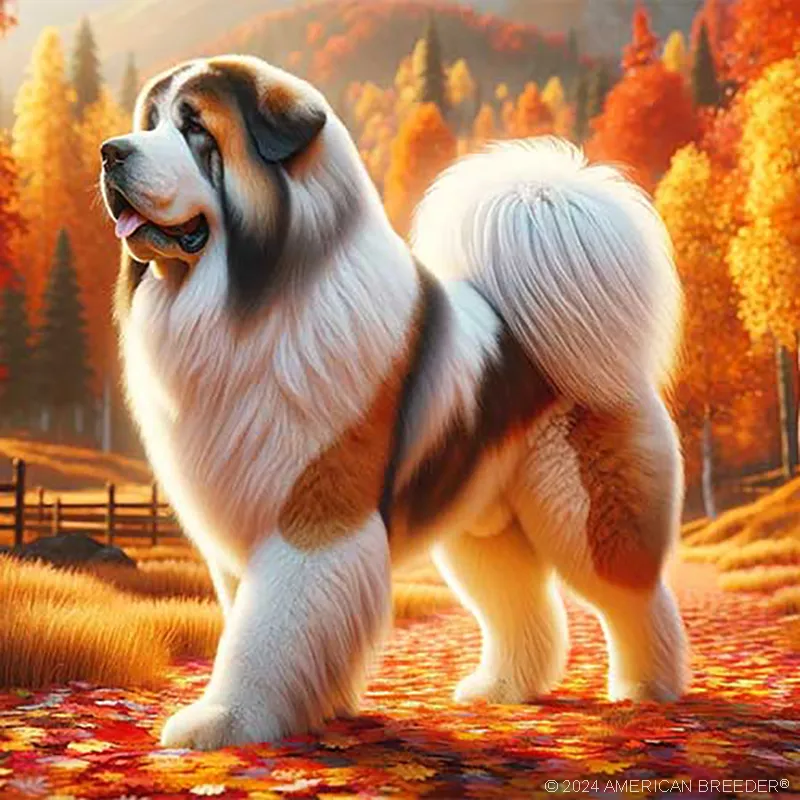 Breed Background: Origin: Bosnia and Herzegovina | Breed Purpose: Livestock Guardian | AKC Class: Foundation Stock Service | Year Recognized by AKC: Not AKC recognized
Breed Background: Origin: Bosnia and Herzegovina | Breed Purpose: Livestock Guardian | AKC Class: Foundation Stock Service | Year Recognized by AKC: Not AKC recognized
Appearance: Size: Large | Weight: 99-110 lbs (45-50 kg) | Coat Type: Dense Double Coat | Colors & Patterns: Various Colors including White, Black, Gray, and Brindle | Distinctive Features: Prominent Mane, Black Mask, Bushy Tail
Temperament: Energy Level: Moderate | Loyalty: High | Friendliness to Pets: Moderate | Friendliness to Strangers: Cautious | Trainability: Moderate | Playfulness: Moderate | Frequent Barker: Moderate | Chase Instincts: Moderate | Sense of Smell: Moderate | Drive to Hunt: Low
Health & Care: Health Issues: Hip Dysplasia, Bloat | Lifespan: 10-12 years | Grooming Difficulty: Moderate | Exercise Needs: Moderate to High
Socialization: Interaction with Children: Good with Proper Socialization | Interaction with Pets: Moderate, Socialization Needed | Interaction with Strangers: Reserved | Elderly Compatibility: Suitable with Care | Ease of Training: Moderate
Suitable Living Arrangements: Apartment: Not Ideal | House: Yes | Rural Area: Preferred | Yard Size Requirements: Spacious Yard Recommended
Training & Obedience: Trainability: Moderate | Intelligence: High | Obedience: Moderate | Problem-Solving: Advanced | Easily Stimulated: Moderate | Focus Level: Moderate | Easily Distracted: Low
Financial Planning: Typical Price Range: $800 - $1200 | Initial Expenses: Puppy essentials, vaccinations | Ongoing Annual Expenses: Food, veterinary care
Breeding: Reproductive Maturity: 12-18 months | Litter Frequency: Varies | Litter Size: 4-8 puppies | Stud Cost: Varies | Breeding Challenges: Finding suitable mates, monitoring health
Did You Enjoy this Article? Share it and Help Us Spread the Word!
If you found this article helpful, we'd appreciate it if you could share it with your friends or link to it from your website, blog, or group! You can also use the convenient social share tabs on the left side of the screen to instantly share this page to your social media feed. For more ways to support and promote the American Breeder Community, visit our Share & Promote Together page for social media posts and memes you can copy and share. Your support means the world to us!
Disclaimer: The information provided in this article is for general informational purposes only and does not constitute legal, medical, financial, or professional advice. While we strive for accuracy, we make no representations or warranties regarding the completeness, accuracy, reliability, or suitability of the information. Please consult with a professional before making decisions based on the content provided. American Breeder Inc. assumes no responsibility for any errors or omissions or for the results obtained from the use of this information.

